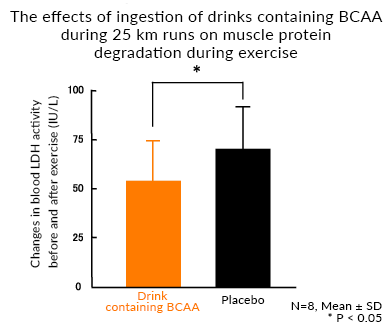Branched-chain amino acids supplementation attenuates the accumulation of blood lactate dehydrogenase during distance running
Koba T, Hamada K, Sakurai M, Matsumoto K, Hayase H, Imaizumi K, Tsujimoto H, Mitsuzono R
J. Sport Med. Phys. Fit 2007; 47: 316-322
Objective
To investigate the effect of branched-chain amino acids (BCAA) supplementation on tissue damage during distance running.
Methodology
Eight male long-distance track and field athletes were given either a drink containing BCAA (BCAA 2g/500mL) or an isocaloric placebo drink, and a double-blind crossover study performed. On 25km runs carried out during a summer training camp for a university track and field team, the subjects were given 250mL of the respective test drinks 30 minutes before the runs and then provided with the drinks every 5km during the runs, with no restrictions on the amount consumed. The subjects also ingested three 500mL servings of each test drink per day for a total of 1,500mL (6g/day of BCAA) respectively for the three days before the 25km runs. Blood samples were taken before and after the 25km runs, and lactate dehydrogenase (LDH) concentrations - an indicator of both amino acid concentration levels and muscle damage - were assessed.
Results
Concerning the volume of the test drinks ingested, there were no differences between groups during the 25km runs (BCAA-containing drink: 591 +/- 188mL vs. placebo drink: 516 +/- 169mL). Blood BCAA concentration levels during the 25km runs were maintained when taking the BCAA-containing drink but tended to decline when taking the placebo. LDH concentrations in the blood during the 25km runs increased in both groups; however, the degree to which blood LDH concentrations increased was significantly lower in the subjects taking the BCAA-containing drink compared to the group taking the placebo.
Conclusions
The results suggest that the intake of drinks containing BCAA during distance running inhibits the decline of BCAA concentrations in the blood and may diminish muscle damage.










